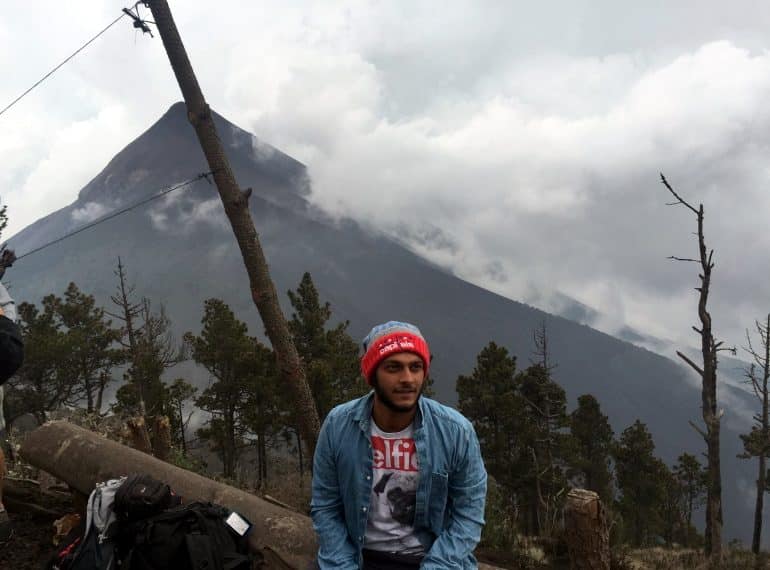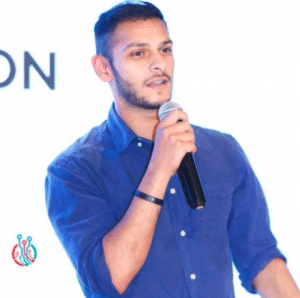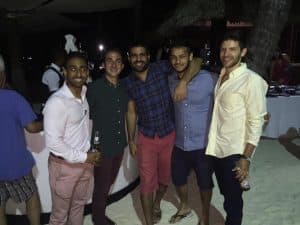Older and wiser – and ready for the next stage

After two life-changing years in Shanghai, Anand Dattani is back in London, with a new job, a fresh perspective on his career and his own reflections on what a post-pandemic world will mean for business.
 His current professional life as a Business Development Specialist with start-up PowerPay – a company offering Chinese e-payment services to European shops so they can attract high-spending Chinese tourists – is very different from the six years he spent with Deutsche Bank.
His current professional life as a Business Development Specialist with start-up PowerPay – a company offering Chinese e-payment services to European shops so they can attract high-spending Chinese tourists – is very different from the six years he spent with Deutsche Bank.
“Having worked at a global investment bank, and for small/medium-sized start-ups, I’ve realised that for me, it is not about the company size anymore, or the ‘thrill’ of the start-up, but about finding a role where, firstly, my particular contribution is making a genuine difference to the company’s success, and secondly I can see where it is taking me in 3-5 years. (I learned from my first manager never to fixate on something beyond five years because a lot can change in that time.)”
In fact, neither his time with Deutsche Bank nor his current role bear much resemblance to the career path he originally embarked upon. Anand left QE in 2006 and was, he believes, the only leaver at that time who chose to study Optometry at university. “This was something I’d looked at doing since I was 15 and did the two-week voluntary work experience at an optician’s. But when doing the UCAS applications, I was torn between Optometry and a business-based degree, largely down to being good at, and enjoying, A-level Economics.”
In the end, although he enjoyed the course at Cardiff and made friends there, after a year, he switched to Cass Business School, where he gained a first-class degree in Investment and Financial Risk Management.
This led to a summer internship and, eventually, a graduate offer at Deutsche Bank. At this point, still not knowing exactly what he wanted to do, he, like many other graduates at Deutsche Bank, followed the well-worn path of undertaking graduate programmes in banking, accounting and consultancy.
“Only after rotating at different desks did I realise what areas and which job role suited me most: I chose the Strategy & Business Management division. My reasons at the time were that I enjoyed building relationships, especially with senior management, and wanted to become comfortable at giving professional presentations that could impact strategic decisions – plus, the numerical skills that QE’s excellent teaching gave me proved very handy in this role.
“After six or so years, I’d experienced periods of loving my role and career progression, and also periods of being stagnant and feeling this wasn’t my long-term vision. And while I could have comfortably stayed at Deutsche Bank and been part of a team that valued me, I had a strong desire to work abroad and also understand the growing start-up space. So I was going to networking events just to connect with some of the bright minds behind upcoming start-ups.
“Eventually I took a big risk and chose international exposure over job security and moved to Shanghai.”
For Anand, having to “start again”, both professionally and socially, involved frequent attendance at networking events, volunteering to help where possible, as well as joining sports teams. In fact, Anand has this advice for anyone interested in working abroad: “You have to be prepared to put in the time to proactively and independently get your name and face ‘out there’ (especially if there is any sales element involved).
“The biggest thing I noticed was how quickly I was able to build a strong network there – even my close friends would say that in six months I had got to know more people than they had in three years. One of the reasons is that in such a global city with a large expat community, people are much more open to broadening their network and making new connections.”
And it was through growing this network that I found a job at the China-based tech startups. His work while based in China’s biggest city included a post as a private wealth consultant for the deVere Group, as well as roles with blockchain platform Younus and with No NDA (nonda), a leader in app-enabled automotive accessories.
There were also a number of ‘side projects’. “One of my friends had recommended me to fill her place on a panel to judge a Dragons Den-style two-day workshop for 400 Chinese students to present their ‘air pollution improvement’ solutions. Following this, other opportunities came, including one to present on cross-cultural communication differences to 50 local teachers. While I only ever reached intermediate level in speaking Mandarin, it certainly served as a bonus. (But the power of being fluent in the language opens up a lot of doors.)”
In the end, Anand concludes, the move to the other side of the world was well worth the risk. “The experiences I have gained professionally and personally in two years were far more than I had gained in the six years at Deutsche Bank.”
Anand returned to London a few months before the pandemic was declared. “The crisis has been a great time of reflection. Working in a business development role for a payments start-up meant that the lockdown has closed out any new business. So life has become very different to if I had still been at Deutsche Bank.
“But it’s also meant I’ve been forced into this huge chunk of free time that you never expect to get once you leave university. It has allowed me to look into some of the long-list of ‘to-do’s’ that build up over the years that you never seem to be able to find time to do, including online courses on programming, fitness goals and looking into a side business that I’d thought of over two years back.
“My realisation is that it’s very easy to become dependent on the job you have – it takes up the largest part of your time, leaving you normally with evenings and weekends to pursue your non-work objectives.. during which time most are tired from working all day.
“The pandemic has greatly sped up a change that was slowly happening, where certain jobs were no longer as safe and dependable (and well paid) as they once were, and people need to be able to know what else they want to explore and achieve in case things don’t go as planned for them. It’s important that people are always working in some capacity towards their goal – and if that is already happening through their job and free time, then they are in a good place.
“My educational and career path certainly hasn’t been one straight line, which may give some of the current and former Elizabethans some comfort that it is ok to explore options, and understand what it is you really want to do and are good at along the way.”
 In his spare time, Anand has completed a number of solo trips across Central and South America – “a huge eye opener and character-builder, which definitely helped me with my move to Shanghai” –and is keen to visit more countries once the pandemic has subsided, including South Africa and Australia.
In his spare time, Anand has completed a number of solo trips across Central and South America – “a huge eye opener and character-builder, which definitely helped me with my move to Shanghai” –and is keen to visit more countries once the pandemic has subsided, including South Africa and Australia.
As for memories of School, Geography classes with current Headmaster Neil Enright “never disappointed”, says Anand (OE 1999–2006). “I would be interested to know if he’s ever had a class like ours.* A fond memory is the day he told us ‘I have some good news for you all: instead of you having the free period shown on Wednesday afternoon (which would have meant us going home early), I’ll teach you for the extra half-hour.’ It looked like he genuinely thought the class would be pleased to hear this.”
He is still in touch with several Old Elizabethans, including his contemporaries Jamie Wolfson, Dominic St George and Fabio Castagno, as well as Jay Shetty.
* The Headmaster replies: “Anand’s class was certainly a memorable one. It was a large group full of lively minds. Teaching them was great fun and I recall lots of laughter. They were outstanding geographers who did really well and I am not surprised that they have gone on to secure stellar careers.”
